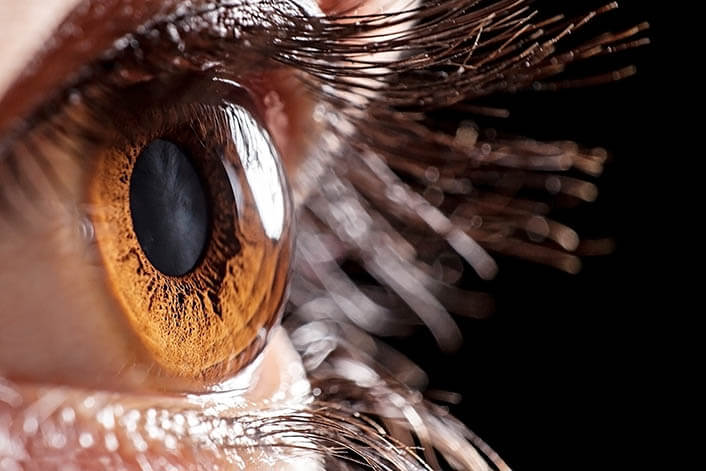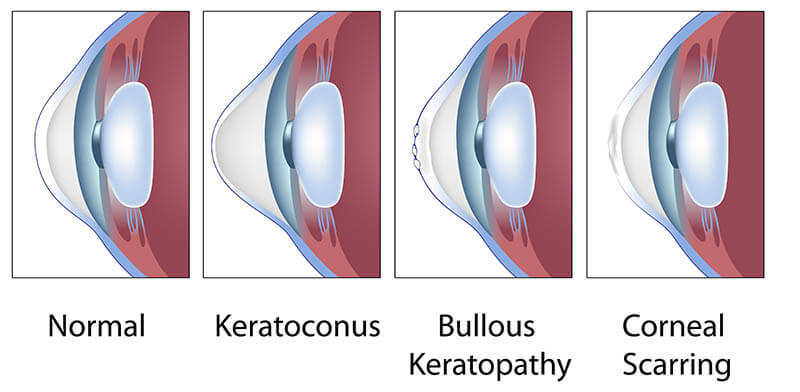Cornea
What is the Cornea?
The cornea is the clear, dome-shaped tissue on the surface of the eye. The cornea may seem to lack substance, but it is actually a highly organized and complex tissue. The cornea lacks blood vessels and therefore gets its nutrients from fluid in the eye (aqueous humor).
The main purpose of the cornea is to protect the eye from injury and infection, as well as focus light onto the retina. Irregularities in the cornea are the cause of common refractive errors such as myopia, hyperopia, and astigmatism. The cornea is made up of five main layers, each with its own job.
Bowden Eye & Associates gives Jacksonville, St. Augustine, St. Johns and surrounding areas the best cornea treatment available. Since the cornea is such an important piece to healthy vision, make sure to schedule an appointment at our Jacksonville office so you can get the proper treatment from our ophthalmologists, both are also Corneal Specialists.
Common Corneal Conditions
The cornea is surprisingly resilient but is still susceptible to many different conditions. Common corneal conditions include:
- Corneal abrasion: Corneal abrasions refer to scratches on the surface of the eye. Small scratches that only penetrate the epithelium will usually heal without any damage to vision. If the scratch penetrates beyond the Bowman’s layer, scarring can occur, which can impact vision.
- Keratoconus: Keratoconus is a progressive corneal dystrophy. In patients with keratoconus, the cornea begins to take on a cone-like shape and bulges forward. This causes extremely blurry vision and gets worse over time.
- Dry eyes: Dry eye syndrome is one of the most common conditions in the US. Dry eye syndrome causes red, irritated, itchy, and dry feeling eyes. This is most commonly due to meibomian gland dysfunction, which causes poor tear quality.
Corneal Procedures
Here at Bowden Eye & Associates, we take pride in offering the best corneal procedures available by our Corneal Specialists. These procedures include:
- DALK. Deep anterior lamellar keratoplasty (DALK) is a newer type of corneal transplant. During this procedure, the anterior (outer) portion of the cornea is replaced with donor tissue, leaving the inner layers (the endothelium) alone. Because the inner layer is retained, the body does not recognize the donor tissue and there is no risk of rejection.
- DMEK. Descemet membrane endothelial keratoplasty (DMEK) is a type of partial-thickness corneal transplant. During this procedure, only the Descemet’s membrane and endothelium are removed and replaced with donor tissue. This is a delicate procedure but ensures faster recovery time and less risk of graft rejection.
- DSEK. Descemets stripping endothelial keratoplasty (DSEK) is a procedure in which only two small incisions are needed to remove the diseases endothelium. Once the donor tissue is inserted, patients will have a stronger cornea and quicker recovery time.
- PK. Penetrating keratoplasty (PK) is a traditional full-thickness corneal transplant. Often performed on patients with keratoconus, this procedure is usually a last resort. While this procedure is performed often and is considered safe and effective, recovery time can belong. There is also a greater risk of tissue rejection than with other corneal transplants.
PROKERA
Prokera is a device that helps to heal and treat eye conditions like keratitis, Dry Eye Disease, corneal erosions, and other conditions that affect the eye’s surface. With Prokera, patients can see faster cornea healing thanks to its natural properties that reduce inflammation and scarring.
Eye doctors can also use the Prokera biologic corneal bandage with topical agents and insert it in combination with other procedures, like to help with healing after corneal cross-linking. Ophthalmologists can also use it after performing DSEK to treat Bullous Keratopathy to help patients recover faster with fewer complications.
Since there are many ways to treat and diagnose the cornea, it is best to schedule a consultation with any of our area offices in the Jacksonville, St. Johns and St. Augustine areas.
The cornea can be very complex and we make sure to give you the best treatment for each diagnosis. If you suspect you may be experiencing any of these cornea symptoms, please do not hesitate to reach out to our team of Eyecare Physicians today.













